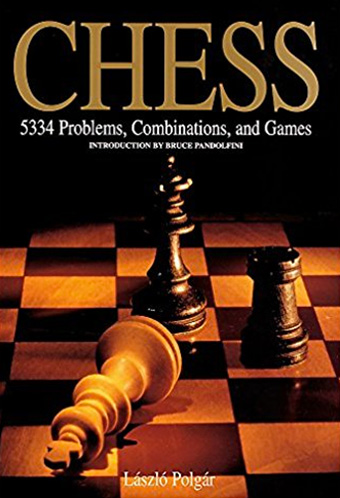Chess: 5334 Problems, Combinations and Games is world famous chess teacher Laszlo Polgar’s best and most complete book to date. As its title implies, the book is a compilation of over 5,000 different chess problems which were designed to both challenge and instruct the reader.
The book is divided into chapters which feature a problem type from checkmate problems to tournament game combinations. In the book you’ll find 306 puzzles for checkmate in one move, 3,412 puzzles on mate in two moves, 744 puzzles on mate in three moves, 600 miniature games, 114 endgames and 128 puzzles showing actual tournament game combinations. All of these are accompanied by helpful illustrations so you can visualize every possible move when solving puzzles.
According to Polgar himself, the book derives most of its contents from the thousands of chess books and periodicals he owns and have read over the years. However, the principles behind the book were derived from his personal experiences with raising his three daughters who would go on to become chess grandmasters and international masters.
Another great thing about the book is that all of the problems presented in it have their solutions provided in the back of the book. This makes Polgar’s Chess a great tool for people, be it novices or advanced players, to learn and improve on their chess playing skills.
People who have actually solved their way through the book found its highly visual nature very effective in their training. Parents who used the book to teach their children chess also attest how effective the method was in improving younger players’ skills. However, more advanced players found the book a bit lacking in the tactics training department as the book focussed on checkmates more than what happens in between.
Still, Polgar’s Chess remains a must-have book that every chess player should have on their shelf.
About the Author
László Polgár is a Hungarian chess teacher and educational psychologist known for raising his three daughters to be chess prodigies to prove his assertion that geniuses are made and not born. Two of the three would go on to become the best and second best female chess players in the world.
Aside from being a child-rearing psychologist, Polgar also wrote plenty of chess books, being a fan of the game himself. His most famous work is Chess: 5334 Problems, Combinations and Games, a mammoth of a book containing thousands of chess variants and games, published in the mid-90’s.
